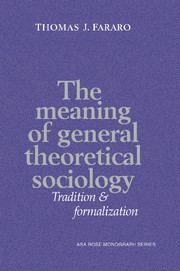Book contents
- Frontmatter
- Contents
- List of Figures and Tables
- Preface
- Introduction
- Chapter 1 A philosophy of general theoretical sociology
- Chapter 2 Dynamical social systems and the key problems
- Chapter 3 Action theory and social order
- Chapter 4 Structuralism and unification
- Summary
- Notes
- References
- Index of names
- Index of subjects
- Other books in the Arnold and Caroline Rose Monograph Series of the American Sociological Association
Chapter 2 - Dynamical social systems and the key problems
Published online by Cambridge University Press: 10 December 2009
- Frontmatter
- Contents
- List of Figures and Tables
- Preface
- Introduction
- Chapter 1 A philosophy of general theoretical sociology
- Chapter 2 Dynamical social systems and the key problems
- Chapter 3 Action theory and social order
- Chapter 4 Structuralism and unification
- Summary
- Notes
- References
- Index of names
- Index of subjects
- Other books in the Arnold and Caroline Rose Monograph Series of the American Sociological Association
Summary
Introduction
The main problems of general theoretical sociology are the problems of the emergence, maintenance, comparison, and transformation of social structures. The aim of this chapter is to show how these problems can be conceptually located within a general process-oriented analytical framework in which the system concept is fundamental. The method is that of the formal study of the properties of defined model objects. There may be (and indeed always are) difficulties in the way of implementing the “dynamical system” ideas to be developed, but their vital conceptual role at the center of general theoretical sociology is what this chapter is about. In short the statement that sets the theme for this chapter is the following:
There are four interconnected fundamental problems of general theoretical sociology. Propositions answering to these problems are, in principle, all consequences of generators defining dynamical social systems.
The fundamental model object is called a behavior manifold defined over a complex network. It is a combination of the possibilities for process in a state space as controlled by the possibilities for variations of conditions in parameter space. The four structure problems are interpreted in terms of the analysis of the implications of theoretical models that specify social mechanisms on a behavior manifold. In brief, the analytical study of such a model proceeds by deductive elaboration to arrive at four types of theorems, each a theoretical answer to one of the four basic structure questions.
- Type
- Chapter
- Information
- The Meaning of General Theoretical SociologyTradition and Formalization, pp. 62 - 152Publisher: Cambridge University PressPrint publication year: 1989



